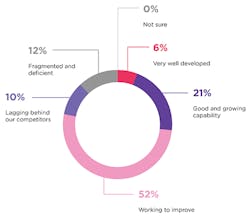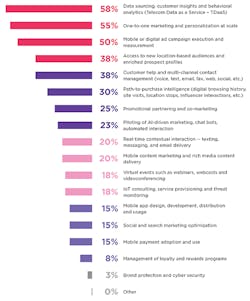Telcos Should Leverage Their Network and Data to Create New Revenue Streams —
The evolution of customer experience into omni-channel engagement is the central force behind brand engagement strategies today. This shift has far-reaching implications across industries, though perhaps most significantly in the telecommunications industry
The expectation by customers and brands alike is that communication and connection are seamless, real-time, on-demand, and always-on. There is an expectation of connection in seconds. Anything less will lead to defection.
How do you rate your company’s omni-channel management capability including technology infrastructure, end-to-end journey/service and talent to power strategies?
Personalization is also a core demand of the omni-channel consumer, led by a belief that the data collected about them is being put to use with the specific intention of adding value to each and every customer experience. Consumers are no longer content to wait for personalization and connected engagements to happen in moments of brand brilliance.
Omni-channel engagements are now the table stakes of business. But this expectation has shone a harsh spotlight onto 2 critical players in the omni-channel experience: the brands creating these connected engagements, and the communication service providers upon whose networks these experiences rely. Omni-channel engagements have created an imperative for new partnerships between telecommunications providers and brands, establishing new opportunities for telcos to emerge as the "secret ingredient" to dynamic brand engagements.
According to 250 marketers (100 from telecommunications organizations and 150 from nontelco brands), omni-channel engagement is the path forward, but profitable success will rely on new partnerships, new strategies and, new insights to engagement.
Defining the Omni-Channel Opportunity
When asked which elements should characterize a complete, data-driven, omni-channel experience, 55% of all marketers agreed that an omni-channel experience must feature fully integrated channels of engagement, including social, mobile, web, contact center, and in-store experiences. Both telco and non-telco marketers also agree that an omni-channel experience should include higher levels of conversion, customer profitability, and retention (49%). "Optimal omni-channel experience means that we can talk to our intelligently within each of our channels," explains Charles Merrin, AVP of CRU and Small Business of AT&T. "But beyond that, we need to be able to manage the experience across channels. If a customer does research on a website, then we are already aware of that experience when they walk into a store and can connect with them in a more relevant way."
What gaps or deficiencies have you identified in your move to an omni-channel model?
Both audiences also believe that it is important to deliver a unified and consistent experience across both physical and digital touchpoints (54% of telco marketers/42% of brand marketers) while individualizing interactions across the customer journey (46% of telco marketers/43% of brand marketers).
For brand marketers, issues around data and continuous learning bubble to the top of the list of defining characteristics — specifically when it comes to the ability to engage in a pattern of continuous learning and leverage customer behaviors and preferences across all engagements (43% of brand marketers/17% of telco marketers).
Digital Disruption and the Impact of the Connected Consumer
This ability to individualize experiences in context and deploy new channels and experiences through a connected, holistic journey becomes more complex given the demands for on-the-go connectivity of today’s mobile consumers.
Through this disruption, telco brands are struggling to keep pace with the need to transform. Only 9% of telco marketers felt their organizations were highly advanced and rapidly evolving to be more data-driven, customer-responsive and digitally adaptive while 47% admitted that while they were evolving, far more effort was needed. Overall, telco marketers feel they are just barely keeping pace as 50% sense that they are missing the mark when it comes to meeting their subscribers’ growing demands for on-demand, personalized engagements.
But it is this drive for deeply personal, rapid engagement that is influencing disruption and contributing to the shift in how telcos are serving and interacting with customers. The heightened expectation for real-time, always-on response (52%), and customers’ shift to mobile content, commerce, and convenience (46%), emerge as the top changes to the business that have most contributed to how telcos serve their customer base.
In what areas do you think MNOs and CSPs could better help brands address omni-channel marketing and customer development needs?
Additionally, telcos have faced more competition from less regulated providers (42%), and must contend with what Accenture dubbed the "switching economy," embodied by the customer’s willingness to defect or disconnect based on price (42%). The ability to transform while keeping costs low is leaving many telcos at a loss on how to best invest in new technologies without increasing rates, which could cost them their customer base.
New competitors and contenders entering the telco space (37%), disruptive innovation from web-driven start-ups challenging the norm (21%), and rapid consolidation and acquisition in the market (19%), are fueling customer churn.
While marketers face increasingly intense competition, they must also manage the changing behaviors and demands of the customer as Millennials shift their content consumption and engagement patterns (38%), and as more empowered, peer-inspired digital customers (33%) continue to expect more intimate and prompt service (35%).
Struggling to Deliver: Telcos Face People, Platform, and Process Issues
Telco marketers do not give their organizations high praise in their ability to fully deliver on an evolved, omni-channel model. Only 4% say their organizations are fully delivering on the promise of omni-channel, where the customer experiences a consistent, personalized, and contextually relevant, experience across all traditional and digital channels. Half say that while they are committed to an evolved experience, they are simply not there yet, and 35% say they have a long way to go until they reach success. Perhaps the greatest roadblocks to accelerating this evolution could be technology and talent.
Asked to rate omni-channel management capabilities around technology infrastructure, end-to-end customer service, and workforce talent, only 6% of telco marketers feel these capabilities are very well developed in their organizations, while 22% feel their capabilities are deficient, and 52% say they are working to improve them.
The inability to effectively map an effective transformation strategy (44%), a lack of talent, technology, and processes (45%), and an inability to specify the right architecture and scalable infrastructure (35%), have all resulted in only 51% of telco marketers believing they are keeping pace with growing subscriber/customer demands.
To resolve these issues, investments must be made, but in a world where budgets fail to meet the price tag of transformation, organizations must make do with legacy systems that often fail to integrate and connect with one another. "The cost of new technology investments, decisions around how to handle current binding contracts using legacy pricing systems, and the pressure to keep CapEx low — all while continuing to make a positive impact on business — are delaying proper action in moving forward with digitization," notes Nitin Anand, Vice President of Marketing Data, Products and Digital at Airtel.
Short-term bottom-line pains often offset long-term customer experience gains as telco marketers question their senior management teams’ commitment to delivering a world-class, omni-channel experience. Only 23% say that senior management is highly committed to delivering an omni-channel experience. When asked how committed C-suite leaders like the CIO, CFO, COO, and sales, service, and support executives, are to delivering an omni-channel experience, that number drops to only 15%. In fact, telco marketers believe that the commitment is inconsistent across leadership (35%), or is simply unclear, lacking, or outright misunderstood, as executives see little value in the strategy (16%).
Mapping a Path to Omni-Channel Success
As telcos struggle to achieve their own digital transformation, they are also feeling pressure from a new, highly influential stakeholder: the brand partners looking to advance their own customer experience and omni-channel strategies. For today’s brands, customer experience is inextricably linked to connectivity. Slow connection, failure to deliver, and lags in real-time response, can cause brands to overstep the thin line between delight and defection.
Simply put, brands need telcos to get it right. 81% of brand marketers surveyed say their business relies on global customer connectivity, as well as secure digital communication, real-time customer interaction, and multi-channel content delivery. Another 13% are extremely reliant on fast and secure connectivity.
In looking at transformation efforts to become more data-driven, brand marketers are struggling to deliver, grading their evolution toward a responsive and digitally adaptive brand as evolving, at best. Only 4% of brand marketers feel they are highly advanced, 13% are still struggling to achieve transformation, and 10% are facing cultural, technical, and operational, hurdles.
To help them overcome these gaps and achieve a true omni-channel model and superior customer experience, brands are looking for inspiration, hoping that telco leaders can establish a foundational framework to help advance omni-channel transformation. Just under half of brand marketers (49%) believe communications service providers can play a leadership role in identifying engagement best practices and providing brands with an optimized framework for engagement.
Brands and telcos will need to become tightly coupled in order to truly fulfill their shared vision of delivering a more gratifying, valued, and relevant, omni-channel experience for customers. To date, 21% of brands have already partnered with telcos to power campaigns, although interestingly, 52% of telcos say they have partnered with brands.
While much of the partnership has revolved around campaign execution — including text messaging, live streaming and geo-targeting or location-based initiatives — marketers have predominantly looked to telcos for assistance with segmentation and targeting digital audiences (42%), customer help and contact management (33%), and mobile content advertising and measurement (42%).
With customer experience at the forefront of transformation efforts for telcos and brands alike, the ultimate goal is to create a seamless journey that aligns brands with customers in full context of both behavior and location, fully attuned to the world around the customer in their moment of need.
Executives have a clear vision of what an optimal omni-channel experience should be responsive, personalized, and driven by real-time, data-driven analytics and connectivity across a growing web of channels. While investments in technology, talent, and training, will be imperative to achieve this vision, brands and telcos will need to tightly align and partner to shed the cultural and operational barriers of an analog past if they expect to profit from today’s omni-channel customer.
Simply providing increased network services will not be enough in today’s customer centric environment. The expansion of coverage and proliferation of connected devices increases the number of potential touchpoints for customers. With increased touchpoints comes increased complexity around ensuring that experience is consistent.
Services must be delivered within the context of a fluid, real-time, and personalized, omni-channel management model. The very data that powers each engagement must be reliably and rapidly passed across systems to take action in real time.
The real challenge is not a lack of aspiration or shared vision. The desire to transform is real, and is a shared goal for both telcos and brands. But, it is collaborative action that will move shared goals into combined results.
This excerpt was created from the report, "Getting Serious About Omni-Chanel Experience", by the CMO Council and Open Roads, August 2017. For more information, and to download the report, please visit https://www.customerexperienceboard.org/research/reports/getting-serious-about-omni-channel-experience.



